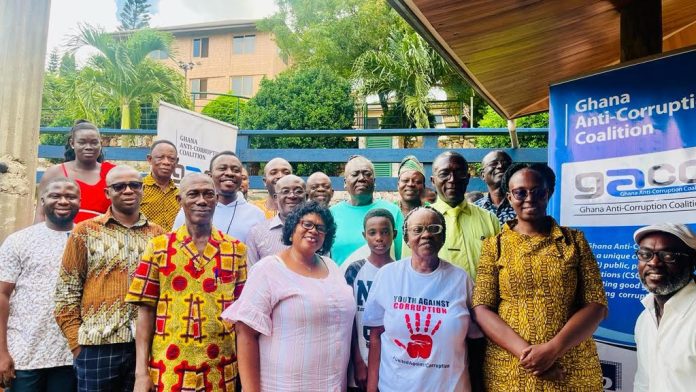GACC launches project to pique individuals’ interest in local government
“Building Evidence for Increased Accountability in Ghana through a Multi-Stakeholder Accountability Initiative.”
The Ghana Anti-Corruption Coalition (GACC), through its Monitoring and Evaluation Office (M&E), has developed an action plan to enhance and whip up citizens’ interest in the fight against corruption as well as local government activities.
Mr Solomon Nyankah, the GACC Monitoring and Evaluation Officer, told the Ghana News Agency in an interview at Aburi in the Eastern Region, that the development of the plan comprised the setting up of appropriate indicators, data collection, analysis, reporting, communication, and utilisation.
He said the plan sought to track resource allocation, utilisation and the delivery of project results within the specified timeframe, while ensuring that resources were effectively and efficiently managed to achieve the desired project results.
He explained that the monitoring and evaluation aspect of the project was a tool or means to systematically and objectively assess the project, right from the initiation stage to the completion stage, and track the progress of implementation against the set project objectives.
Mr Nyankah spoke on the project them: “Building Evidence for Increased Accountability in Ghana through a Multi-Stakeholder Accountability Initiative.”
The project seeks to empower the Local Accountability Network (LANets) focal persons through multi-stakeholder accountability initiatives to increase the building of evidence and the success story of accountability.
The LANets project aimed at building evidence for accountability in the country and had three main strands it sought to achieve at the end.
He noted that the M & E plan had specifically provided management, project staff and stakeholders with information on progress towards the achievement of goals and objectives, stressing that it would provide systematic feedback to enhance learning, adjust and improve planning and implementation for the second phase.
“Thus, it has allowed staff to discover and reinforce early favourable project results, strengths, and successes for decision-making,” he said.
Mr Nyankah also stated that the M &E plan had increased project accountability to all project stakeholders, and through this, the capacity of LANets focal persons had been enhanced in the areas of data collection, analysis, reporting, and communication to demand accountability from stakeholders at the local or district levels.
“Through the monitoring exercises conducted by the LANets, some assemblies have been able to recover all misappropriated funds, with others still working to retrieve their funds,” he added.
It has awakened citizen’s interest at the local level and deepened anti-corruption awareness among them.
Again, as part of the plan, the key challenges that hindered the success of the project included delays in project implementation and delays in reporting. and these resulted from noncompliance from some MMDAs during the monitoring exercise.
Moreover, some assemblies had little to no understanding of NACAP issues, hence making it difficult to access information from them, he said.
He said the second phase of the project would commence in December 2023, and in January 2024, the GACC would train all LANets on the 2022 Auditor General’s (AGs) citations for the various districts to understand the real issues pertaining to each district.
He added that additionally, there will be training for LANets on how to report effectively to the GACC on their monitoring of the project.


